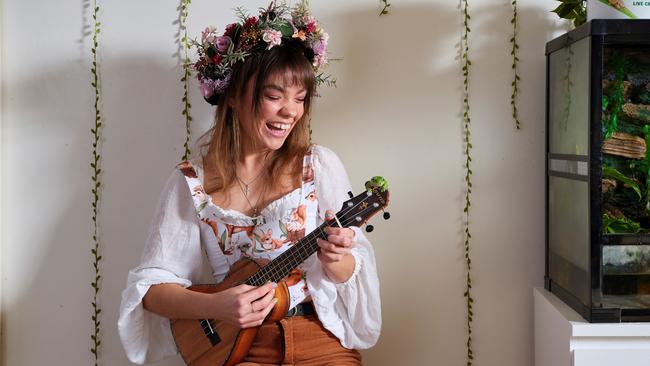Chloe Hayden, star of Netflix’s Heartbreak High, talks neurodiversity
Chloe Hayden, who plays Quinn Gallagher-Jones in Netflix’s Heartbreak High, is shining a light on neurodiversity.

The Netflix reboot of the Australian high school drama Heartbreak High has been renewed for a second season. Has the audience’s embrace of your character, Quinni, taken you by surprise?
The neurodivergent community have been waiting our whole lives for accurate representation, and I knew from the moment I read Quinni’s character synopsis that this was the remedy. It’s not a surprise so much as pure and utter relief and joy that the response has been so positive.
Can you remember how you felt when you were first diagnosed with autism in Year 8?
My mum immediately started crying - which wasn’t a brilliant start to my neurodivergent journey. The first thing I did was google “autism” – all that popped up were terrifying, horrible, fear-mongering articles that spoke about my brain like a disease, like a curse … Becoming comfortable in who I was took a long time.
Did you always feel different to other children?
Always. Since I was a toddler I knew I was different from everyone around me. I felt like I was from an alien planet, that I wasn’t supposed to be here. The world wasn’t shy in echoing that knowledge either.
What is the best depiction of an autistic character that you have seen or read? What made it so accurate and/or convincing?
Honestly, without a doubt, Quinni. Quinni is the only depiction of autism I’ve ever seen that isn’t stereotyped, isn’t showcased by how other people see her, but instead how she sees herself. Quinni is real. That’s apparent throughout her entire story.
Are there any characters you have encountered in fiction or on the screen who are not
explicitly autistic, but who you sense could be?
All the time! Growing up without actual representation, I had to look for it. I think a lot of characters are coded to be autistic, but never explicitly identified because networks are fearful of being unable to capitalise on a character if they’re disabled.
How would you approach the task of playing an allistic (non-autistic) character?
The same way I approached pretending to be allistic for 13 years. I’ve perfected my neurotypical mask quite exceptionally!
What aids do you have on set that help prevent “overwhelm” (the experiences of sensory overload, meltdown, and shutdown to which autistic people can be prone in certain circumstances)?
The crew were all incredibly helpful and accomodating … I had my noise-cancelling headphones with me every day, a sensory room on every single location away from lights and noises. We made sure that particularly emotionally difficult scenes were filmed at the end of the day, or on very short days, and at the end of the week so I could have a break after. I was checked in on constantly. The awesome thing is, after a couple of weeks on set, my cast mates said the accomodations I was being offered were overflowing to them, too. The entire set become more understanding, more accessible for everyone.
What prompted you to write your book Different, Not Less (Murdoch Books) and how difficult was it to share your story?
I’ve been sharing my story through blogs, videos, social media and public talks since I was 18 so writing this book felt like the next stage to that, although it was a new adventure. While in some aspects it was difficult, new and different, it’s also a story that I am so ready to share.
How problematic do you think the gender bias is in the diagnostic criteria for autism? (Many more males than females are diagnosed with autism, and females are generally diagnosed later.)
Massively problematic! So many AFAB people will go their entire lives without a diagnosis, or are even misdiagnosed for years, because, “women can’t be autistic”.
This is simply not true — in fact, recent studies show that there may actually be more autistic women than men.
The Diagnostic and Statistical Manual of Mental Disorders refers to the condition as “Autism Spectrum Disorder”. Do you regard yourself as suffering a disorder? Or is it just a different order?
I don’t suffer from autism. I suffer from how society treats autistic people … That said, I am a disabled person. And that’s not a bad thing, that’s not a dirty thing. I am disabled, and that’s
OK. I’m also magical, creative and brilliant.
Chloe Haydenwill be a guest at The Wheeler Centre’s Spring Fling Opening Gala on November 2.Cecilia Haigh, 12, is a year seven student at a public high school in Melbourne.
To explore the full Spring Fling program of talks, workshops and performances, visit www.wheelercentre.com/springfling


